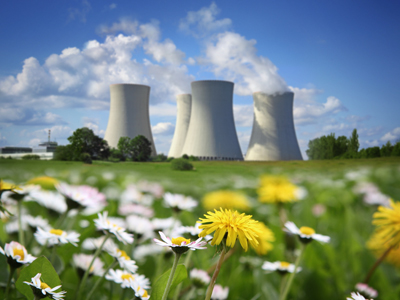

The above is a nuclear power plant.
Chemistry - Nuclear Fusion versus Nuclear Fission
This Science quiz is called 'Chemistry - Nuclear Fusion versus Nuclear Fission' and it has been written by teachers to help you if you are studying the subject at middle school. Playing educational quizzes is a fabulous way to learn if you are in the 6th, 7th or 8th grade - aged 11 to 14.
It costs only $19.50 per month to play this quiz and over 3,500 others that help you with your school work. You can subscribe on the page at Join Us
Have you ever heard of the term “nuclear?” What does nuclear mean? Nuclear is an action that involves the science of studying and manipulating the nucleus of an atom. If you remember from past science lessons, an atom is the very basic unit of all matter. It contains a dense central nucleus that is surrounded by a cloud of negatively charged electrons. The nucleus has proven to be an extremely powerful weapon, as well as a powerful friend to mankind.
Nuclear fission was first discovered by Otto Hahn and his assistant Fritz Strassmann. Fission does not naturally take place in nature. It is created by man through the process of aiming a neutron at the nucleus of an unstable atom. A neutron is a subatomic hadron particle that has no electrical charge.
In 1929, Robert d’Escourt Atkinson and Friedrich Houtermans discovered nuclear fusion by following Einstein’s Theory of Relativity. Fusion can either be created by man or it has a natural occurrence. An example of a natural fusion would be the energy that powers the Sun. This occurs when hydrogen and helium in the Sun collide together and in turn it affects the source of all weather related events.
When fission occurs, tiny radioactive particles are dispersed into the air. Radioactive particles are also known as nuclear decay which can be extremely harmful to man, animals and plants. With nuclear fusion, there are no radioactive particles involved.
The amount of energy that is released by fission is a million times greater than the energy that is released in chemical reactions. However, even with the amount of energy it releases, it is lower than the energy that is released by nuclear fusion.
The atomic bomb is the result of nuclear fission. The hydrogen bomb is the result of nuclear fusion. However, in the hydrogen bomb, in order to first trigger the bomb, a nuclear fission must first occur which is why the hydrogen bomb is even more powerful than the atomic bomb.
If you have heard of a nuclear energy plant, the type of nuclear that is being used is fission, with uranium being the primary fuel used. This is why many people are opposed to nuclear plants because should there be an explosion, radioactive particles will be dispersed into the air, potentially killing everything with a radius of the plant.
Hydrogen isotopes (deuterium and tritium) are the primary fuels used in fusion plants. However, more testing is needed as using energy from the results of nuclear fusion is harder to maintain than fission.
For each of the following ten questions on nuclear fusion and nuclear fission, see if you can find the correct answer to each question.
Ready for more?
not all...
quizzers. Try to win a coveted spot on our Hall of Fame Page.






